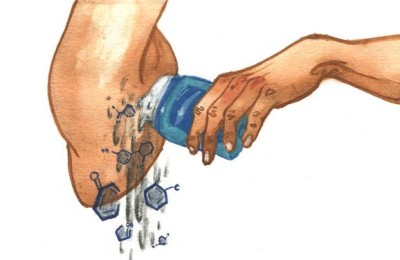For better or worse, hygiene and cleanliness are centrally important in our culture. If you’re like most people, your morning routine probably includes applying some kind of deodorant.
After all, there’s nothing that screams “poor hygiene” like an easily noticeable body odor, right?
The fact of the matter is that sweating and body odor are natural, beneficial phenomena—they allow your body to excrete toxins, and they function as an accurate measure of your body’s chemistry and state of health.
By masking this natural process, you run the risk of closing yourself off from an awareness of what’s really going on inside your body. Just keep this caveat in mind as you read the rest of this article.
The desire to smell pleasant is obviously natural too—and luckily, there’s plenty of ways you can make it happen. Unfortunately, though, conventional product manufacturers have convinced much of the population that their proprietary deodorants are your only hope for smelling clean and fresh on a daily basis. They latch onto the shame of body odor and use it as a psychological trigger. Their commercials are saturated with sex appeal, in order to ingrain a simple association in your mind: using their product will allow you to avoid the inconvenience of body odor, which will ensure that you’re accepted, loved, and perceived as attractive.
Volumes could be written about the dangerous and manipulative flaws behind this kind of marketing. For now, suffice it to say that the convenience of masking body odor comes at a cost—conventional deodorants pose a number of dangers to your health.
Toxins inside and out
First and foremost, conventional deodorants are packed with toxic ingredients (and antiperspirants are even worse). The biggest offender is aluminum, which wreaks havoc on your endocrine system, and has thus been linked to breast cancer, prostate cancer, Alzheimer’s disease, and other serious ailments.
You can usually avoid aluminum simply by choosing deodorants instead of antiperspirants (aluminum, like other toxic heavy metals, seals the pores and prevents sweating)—but even aluminum-free deodorant products contain other worrying ingredients. Many contain parabens, which are profoundly endocrine-disrupting and linked to just as many health issues as aluminum. In fact, a recent study found that a shocking 99% of sampled breast cancer tissue contained parabens.[1]
Propylene glycol—another common ingredient in deodorants—damages the nervous system, liver, and heart. It can act as a skin irritant in as small as concentration as 2%—and yet this substance makes up 50% of some deodorants. Even most “natural” deodorants contain this chemical, so don’t believe the labels until you’ve read the full ingredient list. Manufacturers get away with including this toxin in their products because its harmful effects manifest in the long-term, so its toxicity is harder to demonstrate. They also are able to tone down its irritant properties by adding steareths, which specifically make harsh ingredients feel more mild to the skin, and also happen to carry 1,4-dioxanes with them as carcinogenic byproducts.
Some deodorants even contain triclosan, which is used as an antibacterial agent and preservative. It’s also a pesticide, as well as a potent endocrine-disruptor that forms chloroform when mixed with tap water.[2] How’s that for convenience?
Last but not least, conventional deodorants and antiperspirants greatly inhibit your body from getting rid of pent up toxins. Thus, their effect is doubly harmful—your body is unable to carry out its essential detoxification functions, and new toxins are being added to your system all the while.
This vicious cycle usually ends up getting people hooked on deodorant products, because if you try to stop using them, your body’s detox processes reboot with a vengeance, and then you smell really bad. If you’re convinced that it’s time to break the cycle, though, here’s some tips and alternatives that will help you take the more natural route.
Special Report: Is Your Soap Messing Up Your Hormones (& causing weight gain)
Dealing with body odor safely and naturally
To reiterate a point made at the beginning of this article, your body odor is a natural measure of your internal chemistry. Strong, unpleasant body odor is almost always caused by one of the following factors: bacterial imbalance, excretion of excess toxins, and stress. So, by dealing with these aspects of your life, you can strike at the root of the “problem,” rather than simply masking it.
Washing frequently with lightly antibacterial soap (only natural types, like those that contain tea tree and eucalyptus essential oils) and ensuring proper microbiome health will help tackle the issue of bacterial imbalance. Avoiding environmental toxins (including those in your own house), as well as processed foods and refined sugars, will help lower your internal toxin load. Keep in mind, though, that many of the healthiest foods are strongly detoxifying—which means that they’ll make you smell worse before you smell better! If you give your body the time it needs to get rid of all those nasty toxins (and continue your optimal hygiene and nutrition regimen), your body odor will eventually neutralize. Lastly, address stress in your life by trying meditation and emotional management techniques.
You’d probably also like to know a healthy deodorant alternative that will be instantly effective, though, wouldn’t you? Fair enough—sometimes life doesn’t afford us all the time we need to let our bodies balance their odor naturally.
Whenever possible, I highly recommend trying out the balancing process described above. In the mean time, here’s a quick recipe for a natural deodorant that’s safe, effective, and easy to make.
Natural, DIY deodorant
¼ cup baking soda
¼ cup organic corn starch
2 Tbsp coconut oil
5-10 drops essential oil (choose your favorite scent)
Mix together the baking soda, corn starch, and essential oil first, and then add the coconut oil slowly until the consistency is to your liking. Fill an empty deodorant container with the mixture, and leave it to set for a couple days. If you tend to sweat heavily, you can add other natural drying agents like bentonite clay and witch hazel.
Give it a try—it’s way cheaper, it works surprisingly well, and you’ll experience a special sense of liberation when you realize that your modern conveniences don’t need to be purchased from unscrupulous companies who fill their products with poisons.
Special Report: Is Your Soap Messing Up Your Hormones (& causing weight gain)
References
[1] http://onlinelibrary.wiley.com/doi/10.1002/jat.1786/abstract
[2] http://readynutrition.com/resources/5-toxic-chemicals-hiding-in-your-deodorant_30042014/






